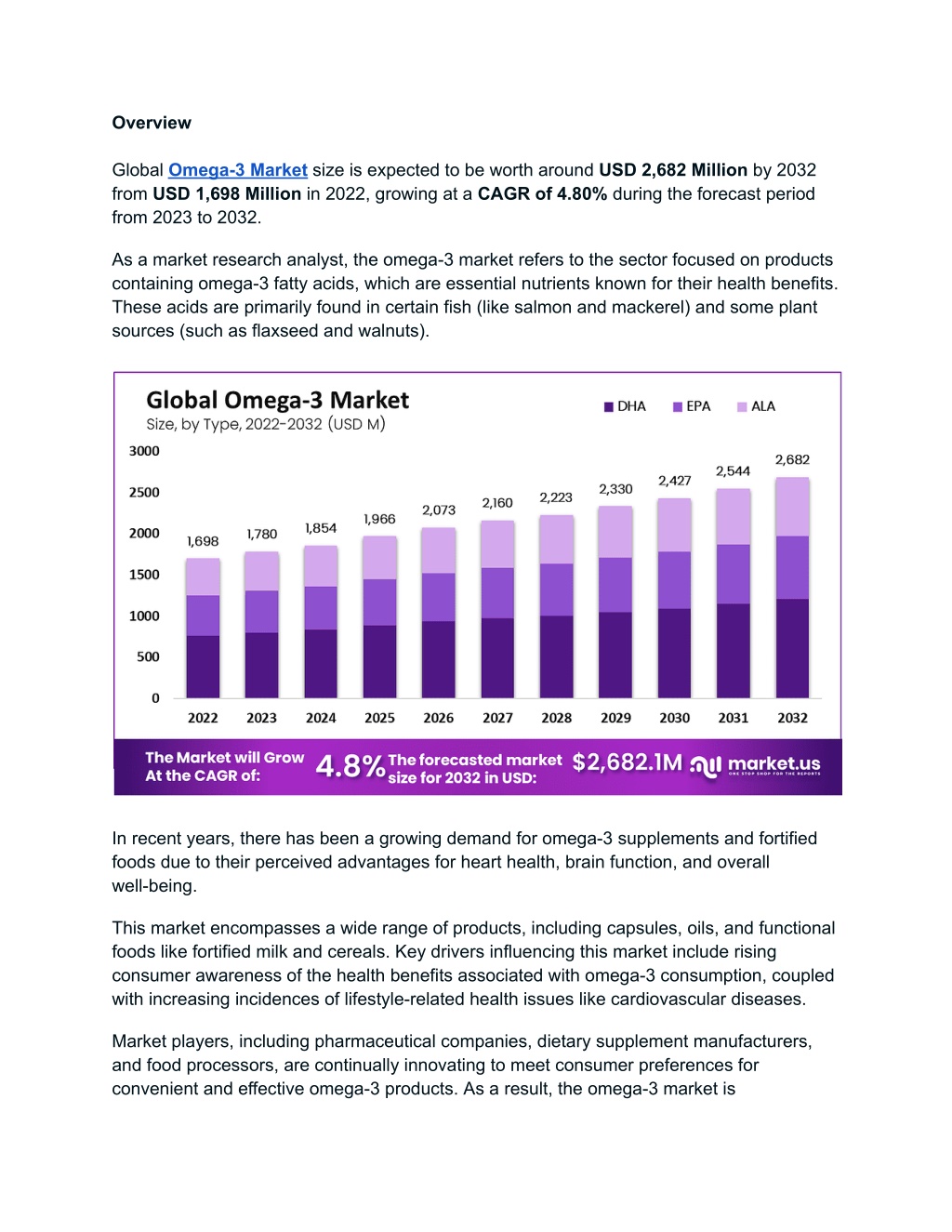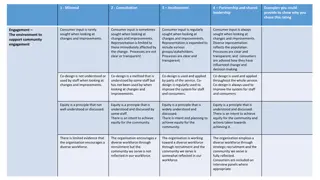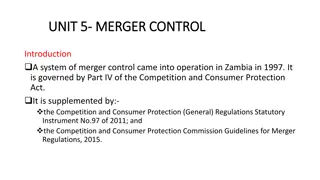
Omega-3 Market: Shifting Consumer Trends Reshape Industry
Global Omega-3 Market size is expected to be worth around USD 2,682 Million by 2032 from USD 1,698 Million in 2022, growing at a CAGR of 4.80%n
Download Presentation

Please find below an Image/Link to download the presentation.
The content on the website is provided AS IS for your information and personal use only. It may not be sold, licensed, or shared on other websites without obtaining consent from the author. Download presentation by click this link. If you encounter any issues during the download, it is possible that the publisher has removed the file from their server.
E N D
Presentation Transcript
Overview Global Omega-3 Market size is expected to be worth around USD 2,682 Million by 2032 from USD 1,698 Million in 2022, growing at a CAGR of 4.80% during the forecast period from 2023 to 2032. As a market research analyst, the omega-3 market refers to the sector focused on products containing omega-3 fatty acids, which are essential nutrients known for their health benefits. These acids are primarily found in certain fish (like salmon and mackerel) and some plant sources (such as flaxseed and walnuts). In recent years, there has been a growing demand for omega-3 supplements and fortified foods due to their perceived advantages for heart health, brain function, and overall well-being. This market encompasses a wide range of products, including capsules, oils, and functional foods like fortified milk and cereals. Key drivers influencing this market include rising consumer awareness of the health benefits associated with omega-3 consumption, coupled with increasing incidences of lifestyle-related health issues like cardiovascular diseases. Market players, including pharmaceutical companies, dietary supplement manufacturers, and food processors, are continually innovating to meet consumer preferences for convenient and effective omega-3 products. As a result, the omega-3 market is
characterized by competitive pricing strategies, product diversification, and ongoing research into new sources and delivery formats to cater to diverse consumer needs and preferences. Key Market Segments Based on Type Ala EPA DHA Based on Source Marine Plant Based on Application Dietary Supplements Functional/Fortified Foods Infant Formulae Pharmaceuticals Animal Feed Pet Food Download a sample report in MINUTES@https://market.us/report/omega-3-market/#requestSample In 2022, the omega-3 market was segmented by type into ALA (Alpha-Linolenic Acid), EPA (Eicosapentaenoic Acid), and DHA (Docosahexaenoic Acid). DHA led the market with the highest sales share, predominantly used in dietary supplements and fortified foods. By source, omega-3 was categorized into marine omega-3 and plant omega-3. Marine omega-3 held the largest market share in 2022, driven by the high content of DHA and EPA found in marine sources such as fish oils, fatty fish like salmon and mackerel, and algae. Marine crustaceans like krill also contributed significantly to omega-3 availability for human consumption.
In terms of applications, omega-3 was utilized in dietary supplements, functional/fortified foods, infant formulae, pharmaceuticals, animal feed, and pet food. The dietary supplements sector particularly fueled market growth. Market Key Players Koninklijke DSM N.V. BASF SE Lonza Group Glanbia Plc ADM Company Farbest Brands SternVitamin GmbH & Co. KG Adisseo BTSA Biotechnologias Aplicadas S.L. Rabar Pty Ltd Golden Omega Kinomega Biopharm Inc. Sinomega Biotech Engineering Co. Ltd. Pharma Marine AS Huatai Biopharm ALGISYS LLC Biosearch Life Other Key Players Driver: The primary driver of the omega-3 market is the increasing awareness of its positive health benefits, including cardiovascular health and overall well-being. This has spurred demand across various sectors such as functional foods, supplements, and pharmaceuticals. Technological advancements improving bioavailability further enhance market growth by increasing the effectiveness of omega-3 products. Restraint: A significant restraint facing the omega-3 market is the rising pollutant content in fish, which can make them toxic for consumption. This poses challenges in sourcing raw
materials and complying with stringent environmental regulations, impacting market supply and growth potential. Opportunity: Opportunities in the omega-3 market lie in expanding applications in healthcare-related industries like pharmaceuticals and pet food. Growing public initiatives focused on health and wellness also create a favorable environment for market expansion, driving innovation and demand for omega-3 products. Challenge: One of the key challenges faced by the omega-3 market is the need for continuous product innovation and differentiation. Manufacturers must navigate competitive pricing pressures and consolidate through strategic partnerships and acquisitions to maintain market leadership and meet evolving consumer preferences.
















































